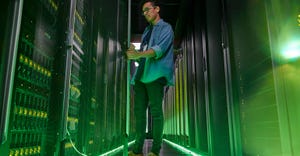UK Startup Raises $30M to Build AI Chips for Data Centers
July 24, 2017

Jeremy Kahn and Ian King (Bloomberg) — Graphcore, a startup that is designing chips specifically for artificial intelligence applications, has secured $30 million in funding, including from leading industry researchers, to fuel its continued growth, the company said.
Atomico, the London-based venture capital firm founded by billionaire Niklas Zennstrom, a co-founder of Skype, is leading the investment round. Graphcore’s existing investors, Amadeus Capital, Robert Bosch Venture Capital, C4 Ventures, Dell Technologies Capital, Draper Esprit Plc, Foundation Capital, Pitango and Samsung Catalyst Fund are also participating in the new funding.
In addition, a number of renowned machine learning experts are investing in Bristol, U.K.-based Graphcore as part of the deal. They include Demis Hassabis, the co-founder and chief executive officer of DeepMind, the Alphabet Inc.-owned artificial intelligence company best known for creating software that beat the world’s top players at the ancient strategy game Go.
The increasing use of artificial intelligence is opening the possibility of a shakeup in the data-center industry, which has been almost totally reliant on Intel Corp. processors for more than a decade. Companies such as Alphabet’s Google, Amazon.com Inc. and Microsoft Corp. have started using new types of chips — some they’ve designed themselves — to take on parts of the processing work they think can be done more effectively than by industry-standard microprocessors.
Machine-learning algorithms, which can require large amounts of computing power, are often run on graphics processing units. But these chipsets, made by companies such as Nvidia Corp., were originally designed for rendering images, mostly in video games and design applications. As a result, they are not ideally suited to artificial intelligence software, Siraj Khaliq, the Atomico partner leading the investment, said.
“GPUs are just not a great architectural fit for the problem,” he said.
Read more: Nvidia CEO Says AI Workloads Will Flood Data Centers
Khaliq said the venture capital firm looked at a number of startups now working to create semiconductors specifically tailored to machine learning and found Graphcore’s “the most elegant.” He noted that while other companies – including Google – were designing computer chips specifically for neural networks, a popular kind of machine learning that mimics the architecture of the human brain, Graphcore’s design was more flexible, able to improve the performance of many different kinds of machine learning algorithms.
Atomico was also impressed with benchmarking tests of Graphcore’s first chip, which the company calls an Intelligence Processing Unit, or IPU, he said. Graphcore’s IPUs are from 10 to 100 times faster than most existing chip designs at critical machine-learning functions, according to the company.
See also: This Data Center is Designed for Deep Learning
Graphcore also is receiving money from Greg Brockman and Ilya Sutskever, who are among the co-founders of OpenAI, a San Francisco-based nonprofit AI research company, as well as Pieter Abbeel and Scott Gray, who are researchers affiliated with OpenAI. Zoubin Ghahramani, the chief scientist at Uber Technologies Inc. and a machine learning researcher at the University of Cambridge, is investing too.
“The key there is to have connections with luminaries in the field, people who give us insight into what people are doing today and what people would like to create going forward,” Nigel Toon, Graphcore’s chief executive officer, said in an interview. “What we have done is take a clean sheet of paper and talked to leading innovators and looked specifically at what they are trying to do and designed a processor to accelerate machine learning.”
The company will begin shipping IPUs to its first test customers by the end of the year and will begin selling them more broadly in 2018, he said.
“Compute is the life blood of AI,” Sutskever said. He said the move from using general central processing units, or CPUs, to more powerful GPUs led to big advances in machine learning. A similar move from GPUs to chip architectures designed for deep learning, a kind of machine learning using neural networks, “will unlock spectacular and drastic progress in AI.”
Toon said Graphcore, which currently employs 60 people, would look to double or even triple in size by the end of 2018. The company raised an initial $30 million in funding in the summer of 2016.
Read more about:
EuropeAbout the Author
You May Also Like









